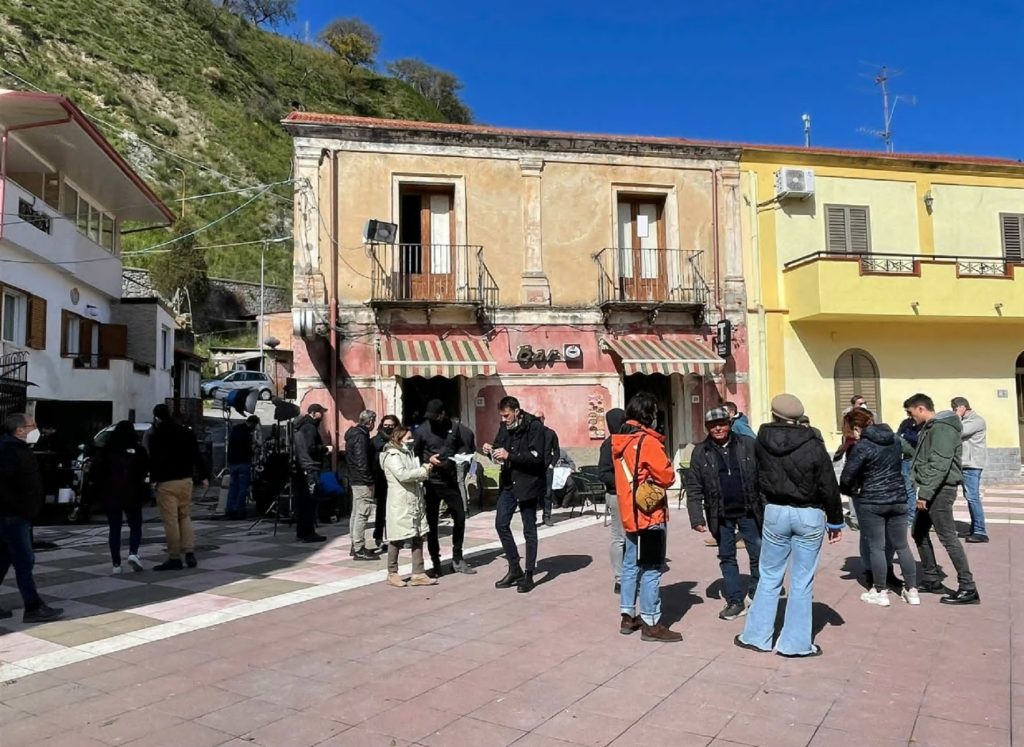
In early May this year, at the age of 17, Swamy Rotolo from Gioia Tauro in Calabria became the youngest to win the prestigious Italian film prize, the David di Donatello, as Best Leading Actress for her role in Jonas Carpignano’s A Chiara (2021).
This victory reflects an unprecedented broader interest in girlhood in Italian cinema and television that A Girls’ Eye View project is concerned with. It is no surprise that, as Jonas Carpignano closed his Calabrian trilogy, he turned to tell the fictional tale of 15-year-old Chiara, a mafia daughter coming to terms with her father’s secret criminal life. Girlhood films are booming across the globe, and many argue that the girl in particular, seen as vulnerable and malleable, but also increasingly as a site of girl power, can become the ideal archetype through which to ask questions about the future of anyone in Neoliberal society.[1] She can offer hope, too. Carpignano’s Chiara demonstrates a resilience that suggests there is a future life for her outside of the mafia. The power with which this story appeals underlines how important it is to create narratives that address women’s central role in the mafia, rather than leave them on the margins. Popular culture promotes a vision of the ‘can-do girl’ – sparkly and powerful – aspects visible in the opening party scenes of the film, but the narrative goes on to challenge the limits real life and family place on that vision of girlhood.
Real life is Carpignano’s forte, but if in A Ciambra (2018)he had the Romani community perform themselves, that approach is impossible with the mafia community, for whom anonymity is essential. As Carpignano says, ‘it’s not a true story, as in my previous films. It’s not taken from Swamy’s biography, but you do see her real family. Their relations are real, inserted into a fictional narrative structure that I wrote’.[2] Some critics suggest that the film appears vague in its treatment of everyday mafia business, which lacks concrete detail,[3] but Carpignano imaginatively ties some of the coming-of-age themes – conflict with parents, friendship groups and rivalries, taking on responsibilities for one’s own actions to how he imagines the hidden world of the ‘Ndrangheta. Like an increasing number of directors, from Céline Sciamma to Andrea Arnold, he seeks authenticity in his commitment to the teen girl’s-eye view in the figure of the untrained, first-time performer, or non-professional, all the more so because the non-professional’s importance for Italian cinema is internationally recognized.[4] Carpignano has known Rotolo (b. 2004) since she was nine and her family even longer. In interview, Rotolo herself says that her stubborn personality inspired the development of her character within the story.[5] The figure of the girl, familiar and vibrant in the affectionate context of her family, offers a compelling way into an unknown (and possibly unknowable world).
The film’s triumph, however, demonstrates that within mafia stories themselves, as the public, especially a female one, grows increasingly wary of mafia heroes, and even anti-mafia heroes, locked in a battle for different versions of masculine supremacy, there is also appetite for something different. Two recent books offer real-life historical material to redress this fatigue. Alex Perry’s engrossing investigative account The Good Mothers (London: William Collins, 2018) narrates the story of how state prosecutors, like Alessandra Cerreti, were able to persuade several women married to the mafia to turn state informants and begin to weaken the ‘Ndrangheta’s hold. Femmine ribelli by Lirio Abbate (Milan: Mondadori, 2013) first narrated the story in Italian and has also recently been made into a film (Una femmina, Costabile, 2021). What Perry writes about the relationship between the ‘Ndrangheta and family – describing how it operates primarily through the family structure – is very useful when thinking about A Chiara and the powerful bond expressed between father and daughter:
The more she read, the more Alessandra realized that the ‘Ndrangheta’s true genius had been in co-opting the Italian family. The more the ‘Ndrangheta made itself indistinguishable from traditional, family-based Calabrian culture, the more anyone thinking of leaving the organization had to consider that they would be abandoning all they knew and all they were. The undeniable love of a mother for a son or a daughter for a father – there were the sorts of bonds that ensured even the most law-abiding broke the law. (pp. 56-7)
Our project team was recently invited onto the set of The Good Mothers, being shot on location in Calabria for Disney Plus. Entering into the spirit of unexplored territories, we get to the village mid-afternoon, after an arduous journey winding down the side of a mountain on a potholed farm track between olive and orange groves. We later discovered that our journey was needlessly arduous and barely 20 minutes, had we found the direct route from Reggio (how we love to glamourize a more banal reality). We glimpse one of the actors of the new series, previously star of the internationally successful televization of My Brilliant Friend, Gaia Gerace, her pale, pinched face weary as she was driven off set. The efforts put in to coach Gerace in Calabrian dialect speak to the series’ ambition to tap into her star authenticity as the brilliant Neapolitan working-class character of Lila.[6] Disney Plus are pulling out all the stops to give this series with the quality TV stamp. We next meet the British director, Julian Jarrold, who has directed episodes of The Crown. Later we discover that rising Italian female director, Elisa Amoruso, will direct subsequent episodes. She is best-known for works that focus on girls and young women: Maledetta primavera (2020), Chiara Ferragni: Unposted (2019).

The Calabrians themselves are bemused by this new attention to their region. On the one hand the gregarious village priest comes out to chat to us in the picturesque chessboard of the town square, the site of real mafia wars, to remind us that this was also the home town of Mino Reitano, a fact far more interesting to the priest and my friends, but less of a tv-saleable commodity than a blood-stained mafia history. Now the village is eerily quiet: the only life provided by the film crew from Rome, and the extras, local lads buzzing round on command on their mopeds. There is something else afoot here, too, though. An elderly local woman is refusing to adjust her daily routine to the rhythm of the shoot taking place on her doorstep. In this she anticipates the increasing irritation of the townsfolk of Reggio Calabria in later weeks, when a car chase is filmed at peak rush hour, and the already traffic-packed, tiny streets of the city completely seize up as parents try to pick up their children from school and go about their daily life.
The tensions between the fictional re-creation of real life that is a film shoot and everyday life are well-documented. However, I find myself curious about what else this new attention to Calabria might bring, beyond traffic jams and grumpy older ladies. The synthesis of feminist awareness, a girlhood lens in particular, and the more common lens of mafia lore might stir the imagination powerfully. The silence and silencing of women is real, just as their few but very powerful recent rebellions against that silence are also real. How these shifts are mediated now, brought out of the silence and into popular culture, is absolutely crucial if the relationship between the mafia, gender, and the terrified silence at its heart is to change. It will be interesting to compare A Chiara with The Good Mothers. My hunch is that the latter, too, will be told largely from the perspective of a girl. Gaia Gerace is to play Denise Cosco, the daughter of Lea Garofalo. Lea’s brave stand against the ‘Ndrangheta cost her her life, and turned her into a symbol for the antimafia movement. In the series, however, it will be Cosco who sees, hears and speaks for her mother.[7] As Anita Harris observed in 2004, symbolically and imaginatively, girls are used to speak to and for the future. It is significant, then, that A Chiara, which points towards the future through the figure of a girl turning 18 is the one to close Carpignano’s trilogy. Its ending is brilliantly ambiguous. Does the film suggest we might be able to exceed the claustrophobic horizons of our origins? Choosing to represent the girl as an authentic Calabrian body is profoundly entangled with ideas about the future, about the ability to speak out that we associate with (or project onto) youth, and about the difficulty of breaking ties with a damaging concept of family.
[1] Handyside F, Taylor-Jones K (eds), International Cinema and the Girl (New York, Palgrave Macmillan, 2016)
[2] La calabrese Swamy Rotolo vince il David di Donatello (zoom24.it)
[3] A Chiara Review: Jonas Carpignano’s Calabria Trilogy Ends on High Note | IndieWire
[4] O’Rawe, C. G. (2020), ‘The Non-Professional Actor in the Reception of Italian Cinema Abroad’, Cinergie – Il cinema e le altre arti, (18). https://cinergie.unibo.it/article/view/10925
[5] ‘Chiara è praticamente Swamy, perché in fondo io ho il suo stesso carattere. Abbiamo anche troppe cose in comune. Io farei la stessa cosa di Chiara, farei come lei. Al primo ostacolo non mi fermo e continuerei ad andare avanti, ostinatamente. Se voglio veramente scoprire qualcosa non mi ferma niente e continuo a procedere. Infatti credo che Jonas abbia proprio preso un po’ spunto dal mio carattere perché sono abbastanza testarda’. Chi è Swamy Rototolo: tutto sulla giovane attrice italiana | Donne Magazine
[6] Dana Renga, ‘Casting My Brilliant Friend’s Authentic Stardom,’ SERIES: International Journal of TV Serial Narratives 6.1 (2020) 77-90
[7] Gaia Girace da L’Amica Geniale a The Good Mothers su Lea Garofalo (optimagazine.com)
proprio preso un po’ spunto dal mio carattere perché sono abbastanza testarda’. Chi è Swamy Rototolo: tutto sulla giovane attrice italiana | Donne Magazine
[6] Dana Renga, ‘Casting My Brilliant Friend’s Authentic Stardom,’ SERIES: International Journal of TV Serial Narratives 6.1 (2020) 77-90
[7] Gaia Girace da L’Amica Geniale a The Good Mothers su Lea Garofalo (optimagazine.com)












